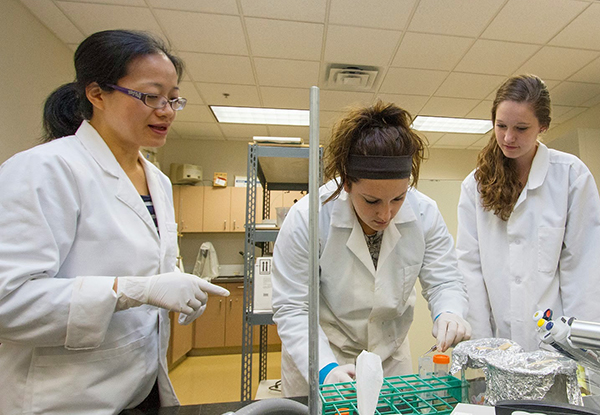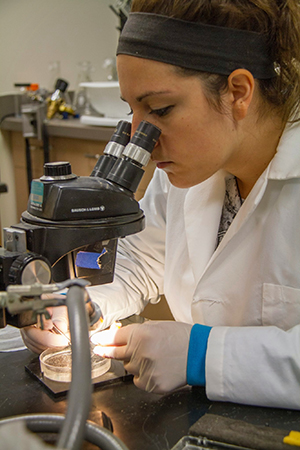Posted 2:39 p.m. Wednesday, Nov. 12, 2014

UW-L students and a faculty researcher are digging in to learn more about this part of the body responsible for digestion — and seemingly a lot more.
 From left, Sumeli Liu, a UW-L biology professor, UW-L senior Lauren Eliades and UW-L freshman Kathryn Thompson. Liu received a three-year, $337,500 grant from National Institutes of Health in August to study a specific type of neurotransmitter released by the gut in response to stress.[/caption]
The human gut is one, big juicy mystery.
UW-L students and a faculty researcher are digging in to learn more about this part of the body responsible for digestion — and seemingly a lot more. Their work could mean medical advances regarding how to treat stress and potentially transplant organs.
Sumeli Liu, a UW-L biology professor, received a three-year, $337,500 grant from National Institutes of Health in August to study the gut’s response to stress.
“The more I work on the gut, the more I realize we don’t know,” says Liu, who has been working on gut-related research since her college days in the 1980s.
In particular, people don’t know much about the millions of neurons inside the gut that control it — also called the “brain-in-the-gut.” While the gut — like other organs receives signals from the brain, it also has its own inner brain embedded in the lining of the gastrointestinal system. The system is so smart that the gut can continue to operate even if it’s severed from the brain.
In this web of gut neurons, Liu hopes to find new information to potentially treat stress-related gastrointestinal disorders, such as irritable bowel syndrome. While the disorder is not lethal, it does influence quality of life, notes Liu.
UW-L senior Lauren Eliades got involved on Liu’s team about three years ago because she wanted lab experience. But, over time, she’s grown more intrigued with her subject of study.
One of the gut’s coolest functions, says Eliades, is its ability to hibernate. Similar to how an animal curls up all winter long — slowing down its heart rate and cooling its body temperature, the gut also slows its movement and cools down at certain times.
What triggers this seemingly random, gut slumber? No one knows. But the answer, says Eliades, could be useful to transplant organs. If they figure out the hibernation trigger, the slowing and cooling could be applied to other organs. She says that would potentially open up the window of time available for organ transplants.
“It’s just a big mystery,” says Eliades as she peers into a thin, clear piece of gut lining below her microscope.
[caption id="attachment_37689" align="alignright" width="300"]
From left, Sumeli Liu, a UW-L biology professor, UW-L senior Lauren Eliades and UW-L freshman Kathryn Thompson. Liu received a three-year, $337,500 grant from National Institutes of Health in August to study a specific type of neurotransmitter released by the gut in response to stress.[/caption]
The human gut is one, big juicy mystery.
UW-L students and a faculty researcher are digging in to learn more about this part of the body responsible for digestion — and seemingly a lot more. Their work could mean medical advances regarding how to treat stress and potentially transplant organs.
Sumeli Liu, a UW-L biology professor, received a three-year, $337,500 grant from National Institutes of Health in August to study the gut’s response to stress.
“The more I work on the gut, the more I realize we don’t know,” says Liu, who has been working on gut-related research since her college days in the 1980s.
In particular, people don’t know much about the millions of neurons inside the gut that control it — also called the “brain-in-the-gut.” While the gut — like other organs receives signals from the brain, it also has its own inner brain embedded in the lining of the gastrointestinal system. The system is so smart that the gut can continue to operate even if it’s severed from the brain.
In this web of gut neurons, Liu hopes to find new information to potentially treat stress-related gastrointestinal disorders, such as irritable bowel syndrome. While the disorder is not lethal, it does influence quality of life, notes Liu.
UW-L senior Lauren Eliades got involved on Liu’s team about three years ago because she wanted lab experience. But, over time, she’s grown more intrigued with her subject of study.
One of the gut’s coolest functions, says Eliades, is its ability to hibernate. Similar to how an animal curls up all winter long — slowing down its heart rate and cooling its body temperature, the gut also slows its movement and cools down at certain times.
What triggers this seemingly random, gut slumber? No one knows. But the answer, says Eliades, could be useful to transplant organs. If they figure out the hibernation trigger, the slowing and cooling could be applied to other organs. She says that would potentially open up the window of time available for organ transplants.
“It’s just a big mystery,” says Eliades as she peers into a thin, clear piece of gut lining below her microscope.
[caption id="attachment_37689" align="alignright" width="300"] UW-L senior Lauren Eliades[/caption]
UW-L senior Lauren Eliades[/caption]
